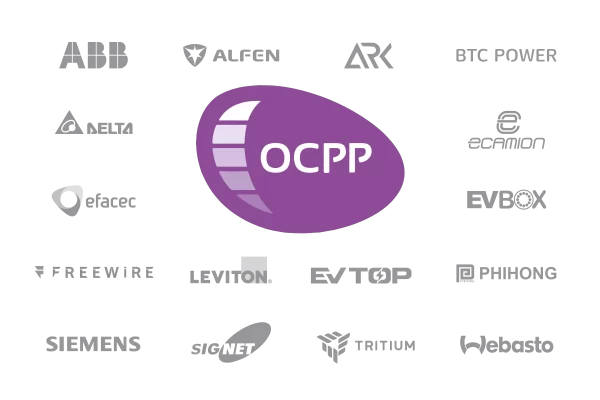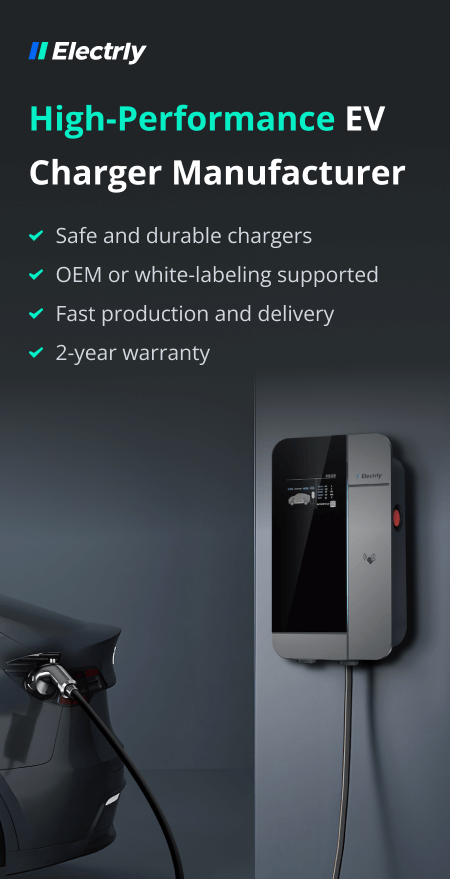Curious about what is Open Charge Point Protocol(OCPP)and why is OCPP-compliant EV chargers important? OCPP aims to meet challenges by giving the possibility of combining software and interoperable systems for EVs without having to install new terminals.
OCPP is an application protocol between the electric vehicle, charging stations and the central management system (also called Back-End or Back-Office). Electric cars are creating the latest benchmark for success of automotives. The growth of this sector can only be driven by the excellence of the coverage of charging stations. In addition to a suitable infrastructure, these charging units must use communication protocols that allow switching from one network to another without having to change hardware. The OCCP aims to meet this challenge by giving the possibility of combining software and interoperable systems for EVs without having to install new terminals.
I. What is Open Charge Point Protocol (OCPP)?

Open charge point protocol OCPP is universal standard communication protocol for operating fast charging for electric vehicles. This protocol for charging is created by the Open Charge Alliance. This is a type of open networking for the newly installed Electric Vehicle charging stations. Billing and maintenance or operation of chargers can be performed without going through a dedicated terminal or a special network. Open charge point OCPP explains a collection of standardized messages that the main system can request or send to the Charge station, and vice versa.
II. Why is OCPP Important to Electric Vehicles?
Many stakeholders are working on improving the interoperability of charging stations, in the hope of imposing their systems on the market. In terms of wallboxes, the use of a single socket guarantees access to all terminals of these three brands. As for public charging stations, we note the presence of different communication protocols, including MSP, CPO and OCPP. If the OCCP protocol is one of the most important and widely used throughout Europe, it is because it has certain advantages. Charging stations will no longer be dependent on individual network providers. If a supplier decides to stop its activity, the operator will not be obliged to renew its infrastructure, because it will be able to switch more easily to another network.
III. What are the Benefits of OCPP?
There are number of benefits for using OCPP, some of them are:
- Charging station owners are less vulnerable to closed or proprietary systems, if a charger manufacturer goes out of business, the information can be transferred to another OCPP-based network.
- It is an open source protocol which means everybody can access the OCPP.
- The nature of the protocol is neutral. OCPP reacts the same to every EV charging station and related software.
- You don’t need to pay anything to adopt the OCPP protocol.
- Makers of OCPP always try to bring new features in it. The latest version is OCPP 2.0.
IV. What is the History of OCPP?
The OCPP protocol was first created by the ELaadNL foundation in the Netherlands. Frank Buve and Joury de Reuver had programmed the protocol in 2013. Many industry players are already using the latest version of OCPP. Now, OCPP is an essential protocol to apply in the UK while working with charging points in 2019. The purpose of creating an open application protocol is to manage the connection between EV charging stations and the central management system for interaction with each other.
V. How does OCPP Protocol Work?
OCPP is available for charging stations as well as for the central system. This system is a back-end software which receives and controls the information of the charging sessions, the reservations and finally the updates.
It allows intelligent charging; this function balances the loads and with other advantages. The OCPP uses an open platform to connect the EVSE (electric vehicle supply equipment) to the backend system which is cloud-based, this facilitates communication to have an accurate idea of the state of charge of the electric vehicles at all times.
VI. Why OCPP?

OCPP Open standards are essential to push the eco-friendly energy industry ahead in making Electric Vehicle chargers affordable, accessible, affordable, standardized, and flexible. Governments, Businesses, and utilities aim to employ huge numbers of EV chargers. OCCP software is easily adopted with every hardware system. OCPP protocol standards significantly made selection easy when buying software facilities and EV chargers. These standards also ease the possibility of stranded resources and aids in better innovation. You can connect many numbers of EV chargers on one single OCPP protocol programmed software.
VII. FAQs on OCPP
1. Are there Different Versions of OCPP?
There are multiple versions of OCPP used, as switching from an older OCPP to a newer one has a significant cost, users will only upgrade if it brings significant added value. OCPP 1.5 and 1.6 are not backwards compatible. At this moment there are 3 versions OCPP 1.5 / 1.6 / 2.0
2. Can any OCPP hardware work with any OCPP software?
Yes, this is the uniqueness of the protocol that it allows any OCPP hardware to work with any OCPP software. Site hosts using the protocol also guarantee that the hardware they have set up will be future-proofed for the coming technology improvements, and by this charging network managing their stations is the best in working.
3. Is OCPP a Standard?
Unfortunately, OCPP does not come in the list of any international standards body such as ISO / IEC (worldwide) or even in national standards ANSI (USA).
4. What Charging Networks Do Not Feature OCPP?
Tesla, Electrify America, EVgo, and Chargepoint are the charging networks which do not feature OCPP. In its place, they are using closed networks only. This means that software and hardware are locked together in the whole lifespan of the charging station. In this case, if the website host changes the software, then they have to change the hardware also.
5. What Charging Networks Do Feature OCPP?
Amp Up, Enel X, Greenlots, Blink, and EV Connect are charging stations which are using features of OCPP protocol. This means they do not have to change the hardware while changing the software of the network.
Conclusion
To sum-up, The OCCP aims to meet challenges by giving the possibility of combining software and interoperable systems for EVs without having to install new terminals. Despite the notorious success of this communication protocol, not all charging networks have necessarily favored it. This is particularly the case at Tesla, which does not use this technology, and which is assimilated to a closed network. However, the American companies may be forced to change its focus and use OCPP as it plans to open its Superchargers to all electro mobilists.

